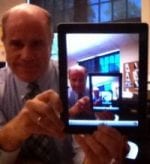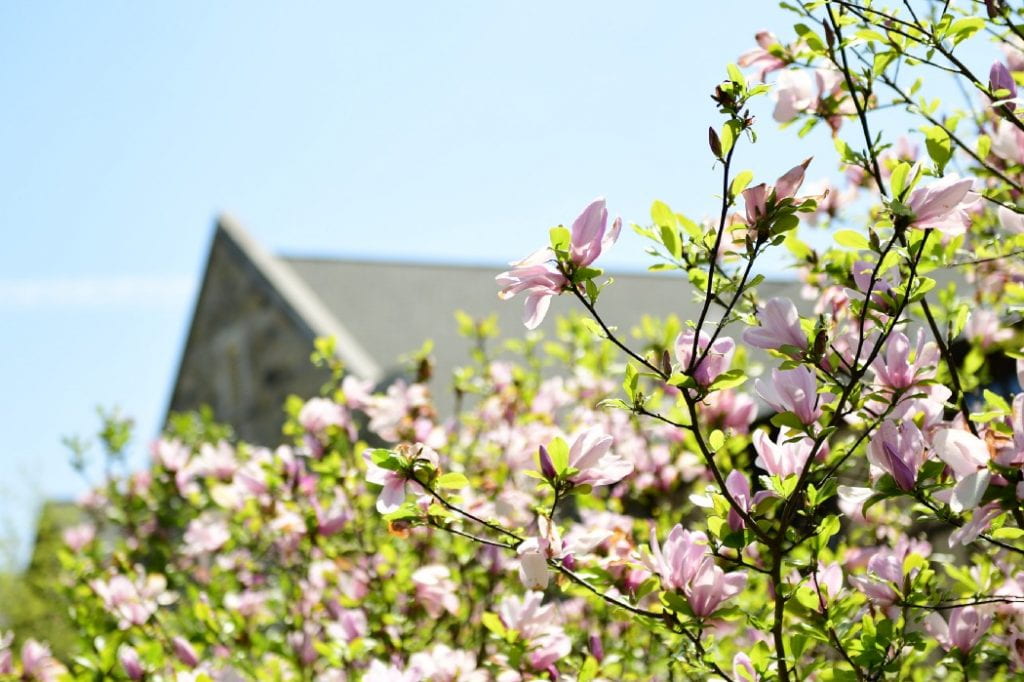In this COVID-19 era, as we prioritize the health and safety of us all, thrust into “stay at home” mode while trying to keep up with our daily lives of work and school, we are all doing our best. We have all been affected by friends and family in harm’s way or suffering from the effects of this terrible disease. Our thoughts and prayers go out to them and all those affected.
Friends and colleagues have commented, however, that I must be particularly well suited to deal with this situation. After all, I already live in the world of managing multiple screens, “Zooming” and VPNing. I am already accustomed to working in the “cloud,” jumping from device to device. Planning and implementing the technology that would support Hackley’s effort to assist the community’s transition to a distance learning environment is the kind of problem I love to tackle. And, in some ways, I appreciate the flexibility and control that the “stay at home” routine offers me, and the time saved commuting to work. Everything I need is within a few steps. I don’t think I have ever been so productive.
I’m naturally a homebody, and I love the extra time with family these times have afforded. I have the good fortune that those close to me are all in good health and the luxury of being an almost “empty nester” at this time. My colleagues who teach from home while their children simultaneously attend school from home have my greatest admiration.
While I am as disheartened by “social distancing” as anyone, I appreciate having time to be alone with my own thoughts. I enjoy reading, walking alone, and reflecting. My job over years has required me to be on campus at odd hours, so I am used to Hackley hallways at night and during school vacations. The peaceful campus provides an ideal setting for me to concentrate and complete necessary work uninterrupted. I have joked sarcastically with fellow employees who work over school vacations about how great school could be without all those people around, given how much more productive we are without the interruptions the busy campus generates.
What awful, cruel joke that is now.
As an essential employee, I continue to go to campus even now, and have had the time to devote to projects that I would not have had otherwise. The campus, in full spring bloom, is still especially beautiful, but the emptiness is different, not so peaceful. Like everyone else, I am trying to find my way and make some kind of sense of our current context.
I have always been a fan of science fiction, and so I inevitably find myself comparing some of our experience with the Post-Apocalyptic sub-genre — zombie movies, the Planet of the Apes series, and the Terminator flicks. Even Star Trek takes place in a future after World War III. I am fascinated by sci-fi writers’ ability to unfold disasters and paint the landscapes that are left — like the subway station in Beneath the Planet of Apes or Washington, DC in Logan’s Run. Hackley’s now-empty hallways remind me of those of scenes, frozen in the time when they were abandoned. This is especially true in the Lower School, where the walls are covered with student work from March and posters celebrating MLK, Jr. Day. I never actually imagined parts of those science fiction stories ringing true in my lifetime.
Technology often plays a big role in those fictional futures, and now more than ever, we need to remember that we do not find our answers in the tools of technology, themselves, but in how we choose to use them. Technology may offer many shiny baubles that purport to solve the problems of the day. But which tools further our mission? Our teachers have done an amazing job of recognizing the power of “less is more” as they remain true to the pedagogies they know will serve their students best.
I am grateful for the technologies that connect me to my Hackley intellectual community, but I miss the rewarding spontaneous conversations with students in the classrooms or at the dining table with fellow teachers. While solitary thought can be a good practice, our learning progresses best while sharing and vetting ideas with others. Even as I appreciate the efficiencies of my day, I crave serendipitous human encounters. I want to visit the Lower School filled with eager learners, for a live reminder of the spirit of Hackley to refresh my professional soul.
Growing up Roman Catholic, I was taught that the Church was the congregation, not the building we call the church, and I believe this is true. In the same way, while our campus may currently be empty like a movie scene after a zombie plague, 293 Benedict Avenue and all of its resources is not Hackley School. Although we are not physically meeting on the Hilltop, we are all still together.
I realize that what I most appreciate about Post-Apocalyptic Sci Fi is how well it illustrates the triumph of the human spirit. People coming together, sharing loss, finding strength as a united people and prioritizing the most important human values to overcome tragedy and renew human culture. Iuncti Iuvamus
Across my years working and living at Hackley I have seen the community go through many trying times, including 9–11 and campus closures due to the norovirus, blizzards, and Hurricane Sandy. Each had its own scale and particular difficulties. Each time, the Hackley community has risen to meet the challenges with grace and dignity, just as it is doing now.
While our future is uncertain and the scope of the problem large, we will continue to move forward, united, helping one another.
Originally posted: Medium – Hackley Perspectives – Technology is Not the Answer


